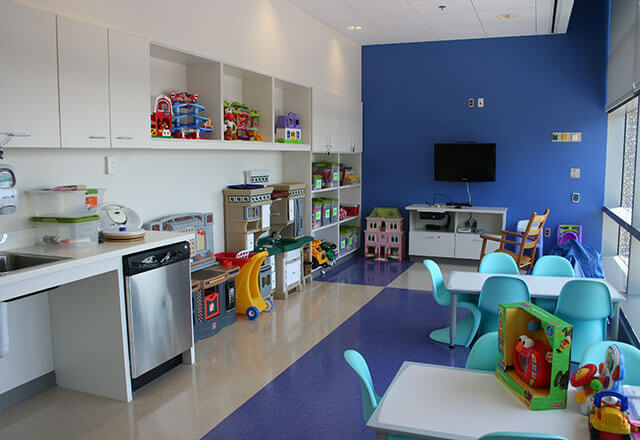Child Life Services

The Child Life Department at Johns Hopkins Children's Center is an integral part of the health care team, working to reduce the stress and anxiety children and families experience related to healthcare and hospitalization. Child life specialists aim to enhance the emotional and social well-being of children and families by promoting effective coping through developmentally appropriate education, preparation, procedural support, and therapeutic play opportunities, amongst various other methods.
Our child life specialists work with children of all ages, from newborns to adolescents and young adults; from outpatient clinics and the emergency department to inpatient units, pre-op/PACU, and radiology areas. Child life also ensures that children have a chance to play in ways that facilitates their healing.
The following services and information are designed to assist you while you are trusting us with your child’s well-being.
More About Child Life
-
Child Life Programs and Resources
Learn about the programs and events we host for children.
-
Supportive Play
We offer specialized medical events and developmentally supportive activities to help children and parents adjust.
-
Child Life Volunteer Opportunities
Learn how you can help children and families visiting Hopkins Children’s have a positive experience.
-
Our Child Life Team
Meet our Child Life specialists.
-
Training Programs
Explore training and internship programs in the Child Life department.
Support for Patients and Siblings For Patients Coping with Health Care Experiences
The Child Life department at Johns Hopkins Children’s Center places a major emphasis on the importance of helping patients and families cope with health care experiences. Caregivers play an important role in planning and practicing useful coping strategies.
Child Life Specialists work with families to:
- Identify the parts of hospitalization or procedures that might be most difficult
- Create and practice a plan to cope with difficult experiences
Benefits of developing a coping plan:
- Gain a sense of control over the experience
- Partner with the medical team during procedures
- Increase self-esteem
- Increase ability to cope with future stressful events
Coping Techniques
Here are some ways to help your child manage difficult experiences associated with hospitalization.
- Counting
- Books, multimedia, games
- Deep breathing, guided imagery
- Positive self-statements
- Blowing (pinwheel, party blowers)
- Bubbles
- Magic wands
- Picture books
- Pop-up books
- Music
- Nature sounds
- Rhythm
- Singing, humming
- Warm or cool pack (see your nurse)
- Massage (hand, foot, forehead)
- Holding, rubbing soft item (comfort item from home like a blanket or stuffed animal)
- Praying
- Singing religious songs, chanting
- Reading sacred texts
For Siblings
The Child Life department at Johns Hopkins Children’s Center recognizes that siblings can often be affected by their brother or sister’s health care experiences. Child Life Specialists serve as a resource for helping caregivers understand and support their children at home.
Difficulties for Siblings:
- Separation from caregivers and sibling
- Change in familiar routines
- Feelings of guilt related to thoughts about their ill sibling
- Fears or misconceptions regarding hospitalization
- Decrease in attention from caregivers
Behaviors to Expect from Your Child:
- Eat or talk less
- Show withdrawn behavior
- Act out in a way to get more attention
- Give outburst of stored up feelings
- Return to behaviors of an earlier age
Child Life specialists can help your child:
- Process events
- Prepare for a visit to the hospital
- Stay connected with hospitalized sibling
- Cope with feelings

